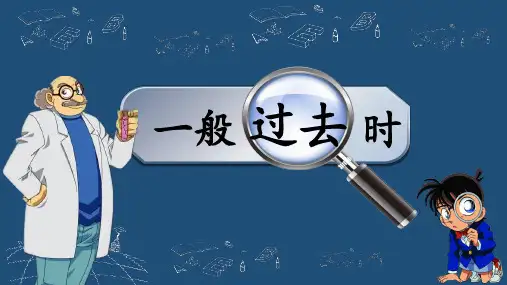精品课件-小学英语一般过去时
- 格式:ppt
- 大小:542.00 KB
- 文档页数:27
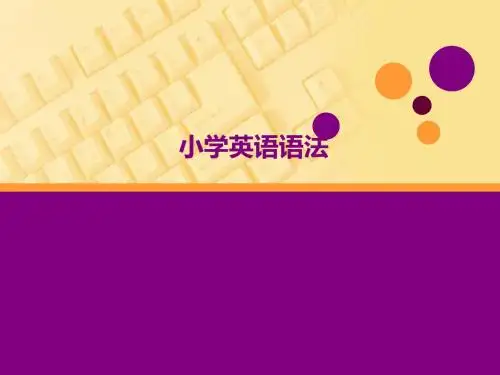
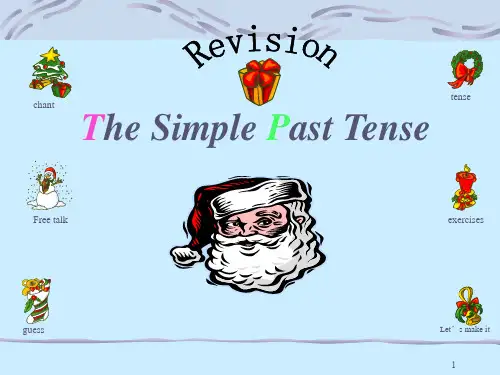
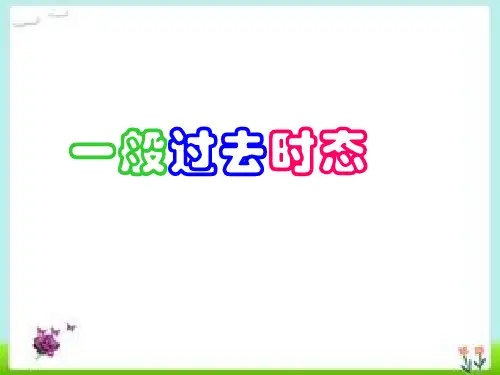
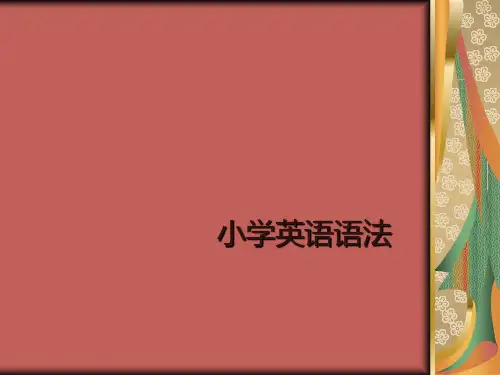
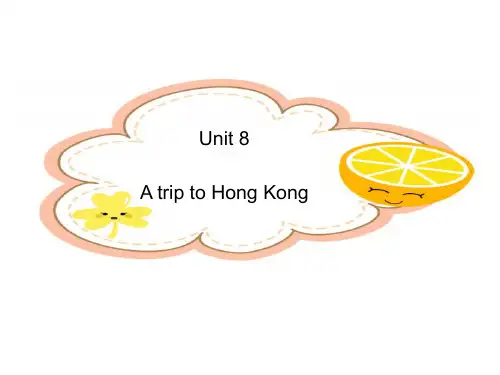
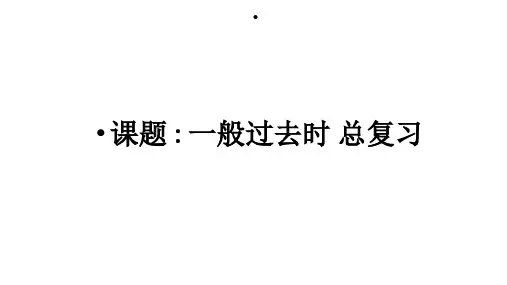
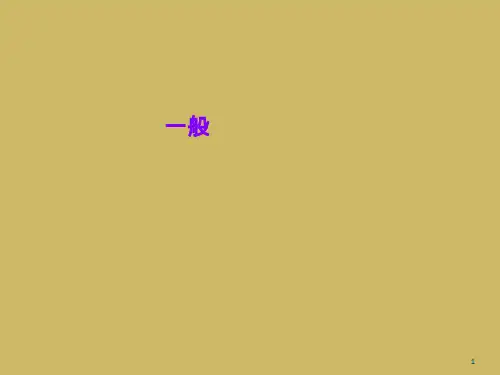
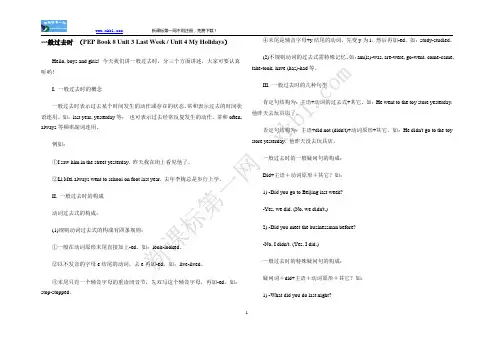
一般过去时(PEP Book 8 Unit 3 Last Week / Unit 4 My Holidays)Hello, boys and girls! 今天我们讲一般过去时,分三个方面讲述,大家可要认真听哟!I. 一般过去时的概念一般过去时表示过去某个时间发生的动作或存在的状态。
常和表示过去的时间状语连用。
如:last year, yesterday等;也可表示过去经常反复发生的动作,常和often, always等频率副词连用。
例如:①I saw him in the street yesterday. 昨天我在街上看见他了。
②Li Mei always went to school on foot last year. 去年李梅总是步行上学。
II. 一般过去时的构成动词过去式的构成:(1)规则动词过去式的构成有四条规则:①一般在动词原形末尾直接加上-ed。
如:look-looked。
②以不发音的字母e结尾的动词,去e再加-ed。
如:live-lived。
③末尾只有一个辅音字母的重读闭音节,先双写这个辅音字母,再加-ed。
如:stop-stopped。
④末尾是辅音字母+y结尾的动词,先变y为i,然后再加-ed。
如:study-studied。
(2)不规则动词的过去式需特殊记忆。
如:am(is)-was, are-were, go-went, come-came, take-took, have (has)-had等。
III. 一般过去时的几种句型肯定句结构为:主语+动词的过去式+其它。
如:He went to the toy store yesterday. 他昨天去玩具店了。
否定句结构为:主语+did not (didn't)+动词原形+其它。
如:He didn't go to the toy store yesterday. 他昨天没去玩具店。
一般过去时的一般疑问句的构成:Did+主语+动词原形+其它?如:1) -Did you go to Beijing last week?-Yes, we did. (No, we didn't.)2) -Did you meet the businessman before?-No, I didn't. (Yes, I did.)一般过去时的特殊疑问句的构成:疑问词+did+主语+动词原形+其它?如:1) -What did you do last night?-I did my homework.2) -Where did you go last week?-I went to Shanghai with my parents.一般过去时口诀一般过去时并不难,表示过去动作、状态记心间。
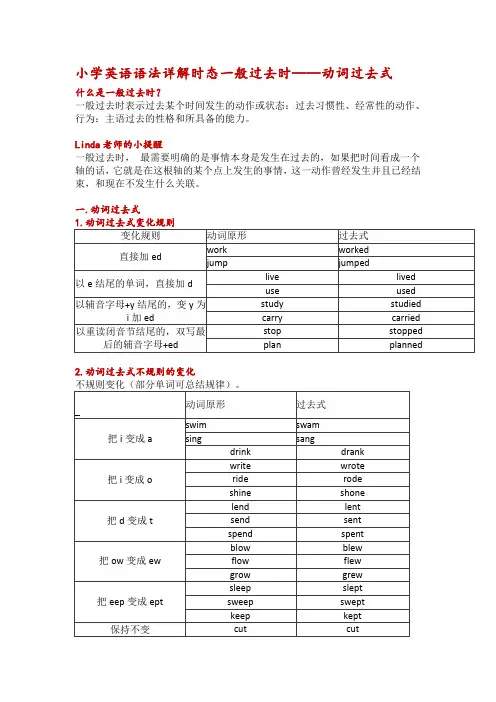
小学英语语法详解时态一般过去时——动词过去式什么是一般过去时?一般过去时表示过去某个时间发生的动作或状态:过去习惯性、经常性的动作、行为:主语过去的性格和所具备的能力。
Linda老师的小提醒一般过去时,最需要明确的是事情本身是发生在过去的,如果把时间看成一个轴的话,它就是在这根轴的某个点上发生的事情,这一动作曾经发生并且已经结束,和现在不发生什么关联。
一.动词过去式2.动词过去式不规则的变化Linda老师的小提醒★大部分过去式还是需要去记忆的:be动词的过去式一was(am,is的过去式). were(are的过去式)。
一些实义动词的过去式,dig→ dug,run→ ran,eat→ ate,fall→ fell,lie→ lay等。
★部分动词的过去式两种都是可以的,比如:lean→ leaned/leant;dream→ dreamt/dreamed;bet→ bet/betted等。
小学英语语法详解时态一般过去时——一般过去时的句式变化二.一般过去时的句式变化1.陈述句:主语+动词过去式+其他I saw the rianbow yesterday.我昨天看到了彩虹。
They went to he park last Sunday.上周日他们去了公园。
Ben got up at six this morning.本今天早上是六点起床的。
2.一般疑问句1)将be动词提到句首陈述句:It was an egg yesterday.它昨天还是一个蛋。
一般疑问句:Was it an egg yesterday?它昨天还是一个蛋吗?陈述句:They were at school just now.他们刚才还在学校。
一般疑问句:Were they at school just now?他们刚才还在学校吗?Linda老师的小提醒主语是第一人称和第二人称的句子,其过去时变化时,要注意be动词的变化。
一般疑问句:Were you at home last night?你昨天晚上在家吗?肯定回答:Yes,I was.否定回答:No,I wasn't.2)用助动词did陈述句:I did my homework at school,我在学校做了作业。
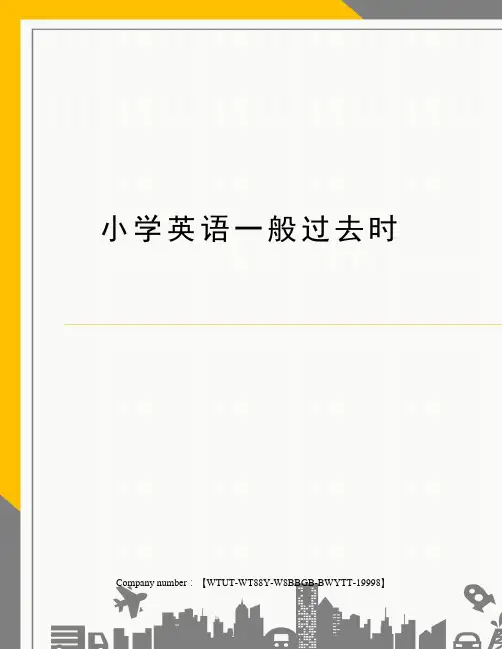
小学英语一般过去时 Company number:【WTUT-WT88Y-W8BBGB-BWYTT-19998】一般过去时A.结构① be动词(is,am, are)→ was/were主语 + 谓语②实义动词→相应的动词过去式①表示过去的事实或状态。
例:He was very busy an hour ago.他在过去的一小时非常忙碌。
I was eight years old last year. 我去年8岁。
②表示在过去某个时间内所作的事情,常和表示过去的时间状语连用。
例:She bought many books yesterday .昨天她买了很多书。
I played table tennis with my friend last Monday.上周一我和一个朋友打了乒乓球。
表示过去的时间状语,有:yesterday,last week ,last year, two days ago,...B.动词的过去式动词有规则动词和不规则动词之分。
规则动词的过去式都是以-ed结尾,而不规则动词的过去式是没有规则。
①一般情况下,在动词原形后直接加ed。
如:wanted,played。
②以不发音的字母e结尾的动词,直接加d。
如:hoped,lived。
③重读闭音节单词需双写最后一个辅音字母,再加ed。
如:stopped, shipped。
④以辅音字母+y结尾的动词变y为i,再加ed。
如:studied,worried。
⑤有些动词不符合上面的规则,需要特殊记忆。
如:am(is)-was, are-were, go-went, eat-ate,swim-swam, buy-bought, see-saw, lose-lost teach-taught, bring-brought, think-thought,直接加edwalk走____________ climb爬_____________turn转弯____________ learn学习_____________cook dinner做饭____________ play the piano弹钢琴____________ visit grandparents看望(外)祖父母__________________________ clean the bedroom打扫卧室__________________________wash the clothes洗衣服__________________________answer the phone接电话__________________________listen to music听音乐__________________________clean the room打扫房间__________________________collect insects收集昆虫__________________________jump跳____________row划____________work工作____________show展示____________ look看____________ help帮助____________relax放松___________ return 归还_____________ pass传递______________ watch insects观察昆虫_____________________________________pick up leaves采摘树叶___________________________________paint绘画______________ kick踢______________ ski 滑雪______________ 直接加dlike像,喜欢______________ live居住______________dance跳舞______________ use a computer使用计算机______________ love爱______________ taste尝______________close关上______________ prepare准备_____________不规则变化eat吃____________ have有;吃____________ buy买____________ take买;带____________ go去____________ sing唱歌____________ teach(taught)教 run(ran)跑 fight(fought)打架get up起床____________ swim游泳____________ fly飞____________swing(swung)荡 sleep(slept)睡觉 sweep(swept) the floor扫地do做____________make the bed铺床____________draw(drew) pictures画画 write(wrote) a letter写信catch(caught)butterflies捉蝴蝶 meet(met)见面drink(drank)喝 tell(told)告诉 ride(rode)骑 find(found)寻找到drive(drove)驾驶 come(came)来 become(became)变成feel(felt)感觉到think(thought)思考meet(met)遇见fall(fell)落下leave离开_____________wake(woke) up醒来 bring带来____________is___________ am___________ are____________ see看到_________grow种植 grew stand(stood)站立词形不变read books读书__________________put放__________________set the table摆饭桌__________________ hit (hit)撞击、打 cut 切、割_______ 最后一个字母双写再加edstop(stopped)停 shop购物 __________________把y变成i再加edempty the trash倒垃圾__________________study学习______________________C.过去式的肯定、否定、疑问及简短回答①过去式的肯定、否定、疑问及简短回答的形式可表示如下:肯定句I (He, She, We, You, They) went there by bus.否定句I (He, She, We, You, They) didn't go there by bus.疑问句Did I (he, she, we, you ,they) go the by bus简短回答Yes, I (He, She, We, You, They) did.No, I (He, She, We, You, They) didn't.②动词be的肯定、否定、疑问及简短回答形式如下:肯定句I (He, She) was there.We (You, They) were there.否定句I (He, She) wasn't there.We (You, They) weren't there疑问句Was I (he, she) thereWere we (you, they) there简短回答No, I (he, she) wasn't.we (you, they) weren't.。
